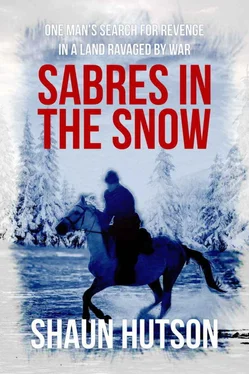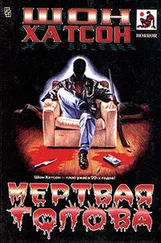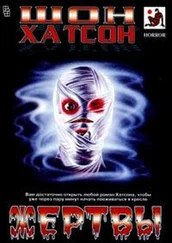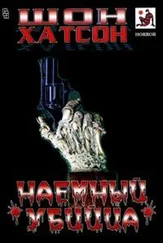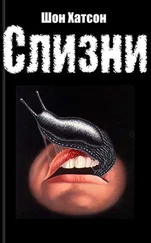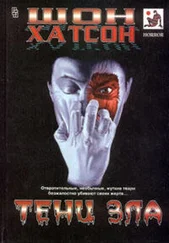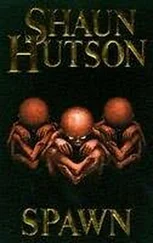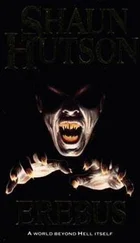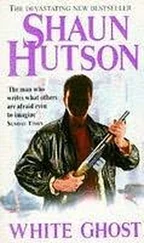But there were other things on his mind too. The countryside was swarming with Germans. All along the Eastern Front, Hitler’s men were retreating. Anatole knew that there was the possibility he would run into some Wehrmacht troops if he was unlucky. It seemed just a matter of which got him first. The Germans or the weather.
He pulled his hands from his pockets and grabbed a tree branch, supporting himself while he sucked in lungfuls of freezing air. His eyes scanned the bushes and trees ahead of him, his ears alert for any movement.
There was a flapping of wings and a loud squawk as a big black crow left its perch in a nearby tree. Anatole watched it soaring up into the darkening sky, its wings majestically brushing aside the snow. He swallowed hard.
There was more movement ahead of him and, crouching low, he drew the long knife slowly from its sheath, advancing towards the sound of movement. It was coming from a bush close-by and, as the youth drew closer, he caught sight of a large rabbit munching away at a piece of greenery it had found. He moved closer, the knife now levelled. The rabbit stopped eating and watched him, its nose twitching nervously. It waited until he was within two feet then bolted. Anatole chased after it, finally hurling himself at the furry shape. He was lucky enough to catch it by the hind legs and, quick as a flash, he brought the knife down, driving it through the rabbit’s back. It uttered a high-pitched squeak and trembled beneath the blade. Anatole wrenched the knife free, noticing how warm the animal’s blood was when it dripped onto his hands. He picked the dead rabbit up and, holding it by the ears, stumbled on in his search for somewhere to rest.
About fifty yards ahead of him there was an outcrop of rock. It wasn’t so much a cave as an overhang but, he reasoned, at least it would give him shelter for the night. Perhaps tomorrow he would be able to find somewhere better. If there was somewhere better.
Clutching the rabbit, Anatole hurried through the trees towards the rocks, scrambling over the icy surface until he was effectively enveloped by the dark stone. It seemed to close around him, its darkness challenging rather than welcoming. He tossed the rabbit to one side and slumped back against a low rock ledge, panting. The snow was still falling and it was freezing cold inside the hold, but at least he was hidden. Tree branches hung low over the entrance giving him further protection from the elements and from any prying eyes be they animal or human. He picked up the rabbit, holding it by the ears, gazing into its sightless eyes for long seconds, then he laid it out on a large flat stone before him and, gritting his teeth, slid the knife into its throat drawing it swiftly down to the point beneath the belly. The skin split open and Anatole used his fingers to pull the fur away, but he was a novice at such work and he accidentally tore one of the legs off. There was a sickening crunch as the tiny joint splintered but the youth continued with his task, cutting with the blade in places where the fur would not come free. When as much of the fur as possible was removed, he prodded the carcass with his knife. He knew what must come next.
As he gutted it, a foul-smelling mixture of entrails and congealed blood spilled from the rabbit’s riven body and Anatole recoiled, trying to hold his breath. Steam rose in the cold air and, fighting back his nausea, he tossed the mess of viscera to one side. The task was a messy one and it took him quite a time. Only when the last of the creatures internal organs had been removed did he realise that he could not light a fire to cook it. The flames, or most definitely the smoke, would be seen by anyone within three of four miles. If he was going to eat the rabbit he would have to eat it raw. The mere thought made him feel sick but, taking the knife, he cut a thin sliver of flesh from its side, holding it before him for a second before he shoved it into his mouth. He chewed frenziedly, eyes closed, trying to ignore the foul taste of the blood which dribbled down his throat. He swallowed the piece of raw meat and quickly sliced off another, eating with similar haste.
By the time Anatole had finished devouring the rabbit his stomach felt bloated and queasy. It was dark now, the only light came leaking in through the tree branches which covered the overhang, provided by a full moon. The moon drew patterns with the branches, casting shadows over the freezing youth. He retrieved the rabbit skin and cut it into strips of varying widths. The widest he wrapped around his hands, others he fastened around his arms and legs, trying to cover the holes in his clothes. What was left, along with the remnants of the carcass, he tossed away. Then, teeth chattering, he lay down on the cold rock, legs drawn up to his chest in a foetal position. He listened to the wind and tried to sleep.
2
The ache in his belly and the icy fingers of frost which jabbed freezing nails into him combined to make sleep impossible and Anatole sat up. He had no idea of the time for he had no watch. He could have been lying in the hole for an hour or a day for all he knew. Now he blew on his hands and rubbed them together, trying to restore some of the circulation. His eyelids felt heavy but not with sleep and now, in the freezing solitude of that hole, he found a vision floating, unwelcome, into his consciousness. The vision of his father and mother being butchered, of his village being burned, of the mound of corpses being incinerated and, striding through that waking nightmare, the vision of that officer. Clad in the familiar SS black, his face scarred from forehead to chin.
Kleiser.
“Kleiser,” Anatole said it aloud, surprised to hear that his own voice was rough and low. He drew his knees up and rested his head on them.
The tears came slowly at first, tears of anger and frustration as much as realisation. He wiped them away hurriedly, aware that, in these sub-zero temperatures they could freeze and blind him. He had heard tales such as that many times in his life. The smell of the rabbit skin was strong in his nostrils but he didn’t worry about it. He sat back against a rock and gazed out, through the mesh of branches, at the moon. It looked as hard and unyielding as pack-ice. A solid lump of frozen snow suspended against a background of velvet. Pinpricks of stars also dotted the heavens. The chill of the night crept around him like an invisible glove, squeezing every drop of warmth from him. Anatole sat motionless, his eyes still fixed on the moon.
How easy it would be to sit here like this and die, he thought. To let the cold take you. The thought began to seem very promising and he closed his eyes. He remembered how, when he was a boy of twelve, he and his father and a group from Prokev had gone out looking for one of the villagers who had become lost in a blizzard whilst searching for his sheep. They had found him two days later, frozen solid, sitting on the ground with his legs crossed as if meditating. His eyes had been closed and Anatole had thought at the time how peaceful the man had looked. As if he had just fallen off to sleep. The eternal sleep of death.
Now Anatole himself sat silently, prepared to give himself up to that eternal sleep, so tired of fighting the cold and his own internal pain. He thought of his mother and father once more, of that bastard Kleiser machine-gunning them both and something stirred within him. He shook himself, suddenly reluctant to permit death such easy access. Anatole got to his feet and walked to the mouth of the hole, parting the branches which covered it.
The snow had stopped, only grey clouds above him served as a reminder that there could well be more to come.
The youth shivered, rubbed his hands together again then slapped his sides in an effort to retain some precious warmth. He carried on like that for some time then he ventured outside the overhang a few yards, reaching for some of the lower branches. The wood was frozen and harder to break but Anatole persevered until, with a snap like a breaking bone, he succeeded in wrenching one of the stouter branches free. He hefted it before him, a thin smile on his face. He repeated the procedure until he had half a dozen such lengths of wood, each about as long as his arm. Then, satisfied with his little collection, he retreated back into the hole.
Читать дальше
